
Inter-activities souhaite vous présenter un tout jeune compositeur de musique de films (et jeux vidéos). Né en 1973, Justin Caine Burnet à été l'assistant d' Hans Zimmer entre 1995 et 2000 pour les studios Media Ventures. Justin à aussi travaillé avec Harry Gregson-Williams et le studio Musikvergnuegen. Il vous confie aujourd'hui son parcours, ses collaborations, et ses projets.
La sortie en Dvd de Souviens-toi l'été dernier 3 est l'occasion d'une rencontre avec un compositeur prometteur!
Please Mister Burnett, how would you personally introduce yourself? (For example, your passions, your tastes in matter of film, music, arts, etc…)
Justin Caine Burnett) My passions are for unique perspectives, and people who are looking for unique and original ways of doing things. This goes for film, music, art, architecture, everything. I think that everything can be a creative endeavor, it is the spirit behind it that inspires me more than anything.
What are your sources of inspiration when you compose film music: styles of music, composers…
I love Debussy, Beethoven, Charles Ives, Morricone, Tom Newman, Jon Brion, U2, Prodigy, Regina Spektor, Juana Molina, Radiohead, Daniel Lanois, Johnny Cash, Willie Nelson, Nine Inch Nails, Chemical Brothers, James Newton Howard, Harry Gregson-Williams, Kronos Quartet, Tin Hat Trio, and many others, but those are the main ones.
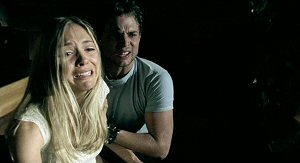 Do you have any mentor?
Do you have any mentor?I would have to say that Hans Zimmer was the most influential mentor for the business side of things for me. My relationship with Harry Gregson-Williams was the most rewarding creatively and ultimately, the work that I did in commercials and trailers has been the best for exploring and finding my personal musical style.
May you tell me about your training?
My schooling is in Music Education and Composition. My training is largely with Hans Zimmer. The amount that I learned from working with him has been considerable.
May you tell me about your background?
I was born in Albuquerque, NM and grew up in Oklahoma. My mother is an Artist, Pianist, and now attorney. My father is an attorney as well as well as a very experienced entrepreneur. Apparently I come from a long line of them. I am one of 14 siblings both blood, step and half. I started as a trumpet player when I was 10 and started composing music at 13. I started composing for Jazz band and moved into piano music and then into electronic music. I learned how to play many instruments including flute, viola, piano, trumpet, and guitar. I am most proficient in electronic music.
What are your memories of your debuts at Mediaventures?
I enjoyed the level of professionalism that was practiced at Mediaventures. Everyone practices a high level of production with a high level of knowledge in electronic music. My debuts there were all very positive and mark the beginning of my professional musical exploration.
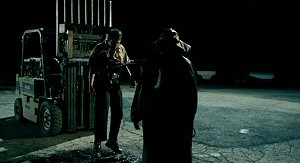 Why did you choose to go there?
Why did you choose to go there?I was referred to Mediaventures by a friend of the family who was temping at the Gorfaine-Schwartz agency. After meeting Hans, I realized what a great experience it would be to work for him.
What did you do there? Your production.
I started as an assistant to Hans Zimmer and continued until I was only working on my own projects. I left there to explore my own personal style in 2000.
Can you tell me about your relation to the two first I’LL ALWAYS KNOW films?
I have no relation to the first two films other than being a patron.
 For your score, were you inspired by John Debney’s work?
For your score, were you inspired by John Debney’s work?For the third, we all wanted to take a departure from the first two scores by John Debney and John Frizzell.
What did the Mediaventures style bring to the musical universe of I’LL ALWAYS KNOW, which was more orchestral?
My score for I'll always know was a complete departure from anything I have heard come out of Mediaventures. My score for I'll Always know was 90% electronic.
How do you see Hans Zimmer? As a godfather? or as a god ?
Hans Zimmer is a great friend and godfather to many. To me he is a good friend who has been a great mentor to me during my time at Mediaventures.
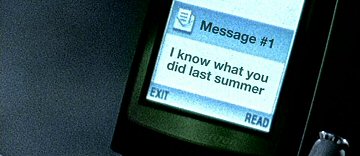 How did you come on I’LL ALWAYS KNOW?
How did you come on I’LL ALWAYS KNOW?I was referred to the director by the producer Nancy Kirhoffer. I worked with Nancy on a film that she and I worked on called An American Haunting.
How much time did you have to compose your score for I'LL ALWAYS KNOW, and with what budget?
I had about 3 months to do the score which was very luxurious and great. The budget was super low, but it also made for a very creative environment for making the score. Essentially I bought a few instruments and performed and recorded a lot of the score myself.
What orchestra and what size did you choose? Did you use some electronic sounds in your score or was it all live?
The score was 90% electronic, but it is important to understand that it wasn't a boxed score, I performed cello,electric cello, bass, guitar and live percussion that I produced and morphed to create the music. I hired a singer by the name of Aeone who performed the vocals and contributed to some additional music in the score. I hired a guitar player named Peter Maunu to do sone atmospheres and perform for the main titles and one other cue. I hired a cello player to create some great effects for me. There was very little that was "boxed."
How did you work, and with what request from the crew (director, producer, music supervisor, temp score)?
There was no set temp score to work with. Sylvain White and I decided early on that the main character needed a more conventional theme. We also wanted to fuse some rock elements in the score in line with some of the work that I did on "Man on Fire". Outside of that, we wanted a very industrial, different score that was dissonant and very different from most other horror scores. By all means we wanted to avoid the typical orchestral horror score. Nathan Barr's score for Cabin Fever was an essential inspiration for I'll Always Know.
Why did you accept to do this film?
Because it was an opportunity to work with a great director and my friend Nancy
What do you personally think about the subjects of the film?
Its great entertainment.
Did you use your experience with mister Zimmer to help you on I’LL ALWAYS KNOW or other film music?
The experience that I gained from the many years of working with him always proves valuable.
What is the role of music in I’LL ALWAYS KNOW?
The music is meant to heighten the production value as well as the horrific subject matter.
How would you describe your music for the film?
The music in the film is a fusion of heavy electronic rock and horror cinema music. It was meant to be a departure from the typical horror scores of the day.
How would you describe your score for horrific or suspenseful scenes? Is there specific theme for that? If yes, may you describe it?
The horror scenes were driven by electronic percussive and glitch elements with cello, guitar and bass drones and motifs. I can't say there was a specific theme of any sort but these elements combined to make and interesting atmosphere.
Did you choose special instruments for the score? (ethnic, folk…)
I chose cello, electric cello, bass, guitar, about 20 triangles tuned down electronically, sherman filter, ebow, egg beaters, pots, pans, and various other noise makers.
Why is there no soundtrack album of the scores you made for this film?
There is a very small label that is talking about putting out an album for 07'.
Is there any anecdote (funny or moving) about the productions we’ve just evoked that you would like to share with us?
This movie was one of the most enjoyable composing experiences I have ever had. Working with Sylvain White was fantastic. He is a very talented director who will go very far. Working with Nancy, Peter and Amanda was fantastic as well. We all had a great time on a really fun film.
For a new project, if you could choose a genre, a kind of story and a filmmaker, what would they be?
I would like to do some lighter fare for a change.
Do you have any other projects to come?
I am currently working on a serial killer thriller called "Gray Man" and have a video game called "Syphon Filter" coming up after that. I am also working on an album with the singer Petra Haden in which she is covering some of her favorite movie tunes.
Do you think a fourth opus is may be envisioned?
You never know.







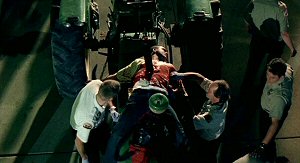
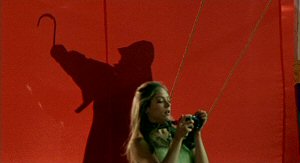






 Did you collaboration evolve from one film to another ?
Did you collaboration evolve from one film to another ?


